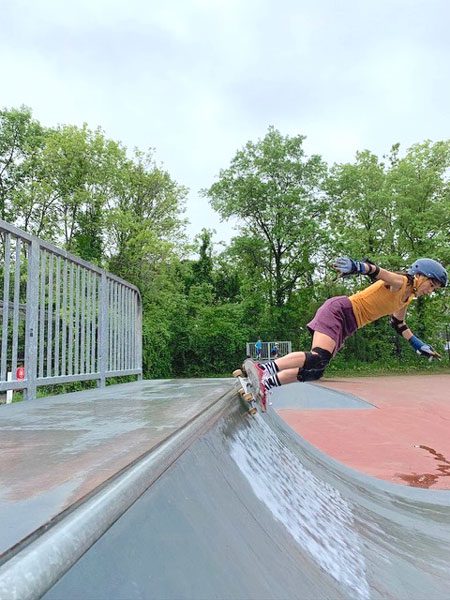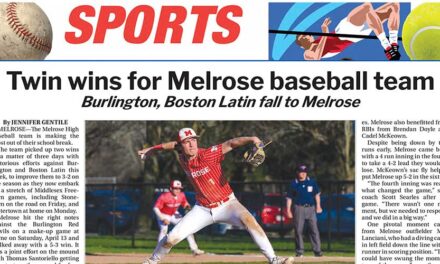Published July 5, 2019
By ELIZABETH CHRISTOPHER
Special to the Melrose Weekly News
MELROSE — Tattoos, piercings and baggy T-shirts.
“Skaters looked cool, and I wanted that look,” said Hon Carolan, a Melrose resident and mother of two, about the 1990s’ rebel image that first attracted her to skateboarding as a teen.
Carolan immigrated to America with her parents and siblings from Thailand in 1995, settling in Boston. Soon afterward, she bought a pair of Vans and hopped onto a skateboard for the first time.
“It was hard; I fell down a lot. I gave up right away,” she said. When she met her husband, Greg Carolan, who has been skating for more than 30 years, she gave it another try. “We built a ramp in our loft in Chinatown. I busted my chin and I quit,” but she never let go of that desire to skate.
As her 45th birthday approached, Carolan decided it was time to finally do what she had always wanted to. Since January, she’s been at the Melrose Skate Park almost daily practicing tricks and turns.
I asked her what’s different about learning to skate now that she is in her mid-forties.
“Mentally, I’m a stronger person. I know now that skating is not about ‘a look,’”—it’s about passion and discipline. “You have to be on the board every day. No matter what,” she said. If it snows or rains and she can’t be at the park, then she is in her basement with her feet on the board. “It’s like mediation. When I’m on the board, I’m thinking of nothing else.”
Carolan feels fortunate that Melrose has a public skate park so that skaters and scooter riders of all ages can practice their skills in a safe place. But there are challenges. She explained that it can be dangerous when people use the park as a playground for their small children and dogs or as a picnic area. She often has to pick up trash and soda cans or sweep the area of other tripping hazards before she skates. After Memorial Day Weekend, her family scrubbed the half pipe to remove a greasy residue.
“Skaters are in training,” she said, and litter poses a serious hazard, as do the cracks and bumps in the ground at the bottom of the ramp.
The Carolans have skated at parks all over New England, from Boston to Burlington, VT, so they have seen safe, well-maintained parks. Where does Melrose fall on the spectrum?
“Somewhere in the middle,” said Carolan, who thinks if the park were a little better maintained, there would be a stronger skateboarder community in Melrose and it would be a safer place for beginners and children to learn.
Right now her two children, ages 7 and 9, are not interested in skating, but Carolan hopes they will develop a passion for it like she did because it’s a sport that “can keep you for life. You spend months learning one trick, then you move on to the next one.” It’s like learning the piano—it takes time, practice, and focus to develop that muscle memory and confidence, she said. She also likes that skating is creative—skaters bring their individual styles to the sport. “You are who you are on the board,” she said.
After six months of training, Carolan’s list of accomplishments is growing. She can “drop in” from the top of the half pipe, turn and “Rock to Fakie.” And last week she learned how to do a “Fakie Disaster,” which means approaching the ramp backwards, with her weaker foot and touching the “coping” at the top of the ramp with her board. When I asked if she is still afraid to fall, she said no. “The more I fall, the more I want to land that trick.”
“Skating is like life. Everything feels impossible at first,” she said. “But each day you practice, it becomes a little more possible. And then one day you land the trick that you’ve been working toward for months and that feels like nothing else. You see that anything is possible if you work at it.”
What advice does Carolan have for people who want to learn to skate?
“Don’t get frustrated, work hard, and have fun.”






